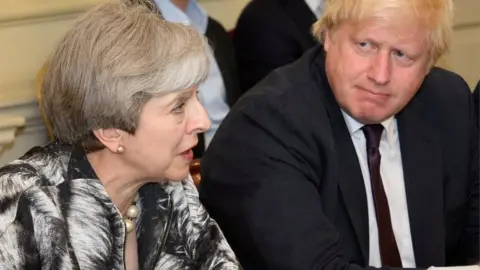Brexit: Boris Johnson refuses to rule out Theresa May challenge
Boris Johnson has repeatedly refused to rule out challenging Theresa May for the Tory leadership as he warned of "political and economic disaster" if she stuck by her Brexit strategy.
Asked four times by the BBC's Laura Kuenssberg to rule out a challenge, the ex-foreign secretary said: "My job is to speak up for what I believe in."
Mrs May would stay in office "as long as she feels it necessary," he said.
But, he added, her Chequers plan was "simply intolerable" and must go.
"My duty now is to make the case for freedom again," added the Tory backbencher, who was a leading figure in the campaign to get Britain out of the EU.
A government source said Mr Johnson was "regurgitating ideas", not coming up with any new answers.
Mr Johnson quit the cabinet in July in protest at Mrs May's plan for future economic co-operation with the EU, which he says will curb the UK's sovereignty and betray the 2016 referendum vote.
His latest attack on Mrs May's policy, which would see the UK sign up to a common rule book for trade in goods, comes two days before the start of the Conservative Party conference.
In an article for the Daily Telegraph on Friday, Mr Johnson claimed the Chequers plan was "a moral and intellectual humiliation" for the UK and it was not too late for Mrs May to back a "super Canada" deal, which is favoured by many Tory Brexiteers.
Speaking to the BBC's political editor, in his first interview since quitting the cabinet, he rejected suggestions he was simply trying to make life difficult for the prime minister, describing Theresa May as a "remarkable person".
"As she said to us herself and she said to the country...she will go for as long as she feels it necessary."
'Change course'
He urged Mrs May to "get back" to the principles he said she had initially set out in Brexit negotiations before, in his words, being "blown off course" by the 2017 general election.
Asked to rule out a leadership challenge if this did not happen, he replied: "My job is to speak up for what I believe in and the vision that I've set out today and I believe in it very very sincerely.
"I'm going to keep going for as long as it takes."
He added: "The most important thing for me is to avert what I think would be a political and economic disaster for this country. To come out of the EU but still to be run by the EU - what is the point of that?"

Analysis
 Reuters
ReutersBy BBC Political Editor Laura Kuenssberg
It is no secret that he still wants and believes he has a shot at Number 10.
And having turned down interviews for several months after his departure from government, speaking out today on the eve of the Conservative conference outwardly appears designed to stir as much trouble as possible.
Mr Johnson is adamant, of course, that what he is really involved in is trying to change Number 10's policy, rather than trying to shove Theresa May out.

The Chequers plan was "unacceptable" to the British public, he said, and it was "pie in the sky" to suggest, as some have done, that it could be modified after the UK's exit from the EU on 29 March, 2019.
"It will do lasting damage to the credibility of this country around the world. People will say the UK is a greater power, a great economy. Why are they so passive and so supine as to remain in the orbit of Brussels."
Asked whether he was prepared to actually vote down a deal based on Chequers if it came to it in Parliament, and potentially see the UK leaving without a deal, he said: "You will have to see."
But he added: "At the moment, I cannot see how I can support Chequers, I have to be honest."
'Regular fix'
In response, a government source said: "Boris was a member of the Cabinet that agreed the December Joint Report and praised the PM for doing so.
"The truth is that reneging on those things would simply guarantee no deal."
And Tory MP Sir Alan Duncan - a junior minister in Mr Johnson's old department - said his former boss was addicted to media attention.
"Publicity is his cocaine. He needs a regular fix," the foreign office minister told The Spectator. But, he added, Mr Johnson's power as an "electoral asset" was "now waning".
The UK and EU are seeking to negotiate the terms of exit, as well as an outline agreement on future cooperation by the middle of November at the latest.
But the European Parliament's representative in Brexit talks warned the UK it will not approve a relationship with the UK where EU nationals were discriminated against by nationality or type of job.
Referring to the cabinet's recent decision that EU nationals would not be privileged in the UK's new immigration regime, Guy Verhoftsadt said the system for EU citizens coming to the UK after Brexit would likely be reciprocated for British citizens moving in the other direction.
Meanwhile, the EU's Brexit negotiator Michel Barnier has ruled out standing as a candidate to become the next head of the European Commission, saying he was committed to seeing the talks through "right to the end".
